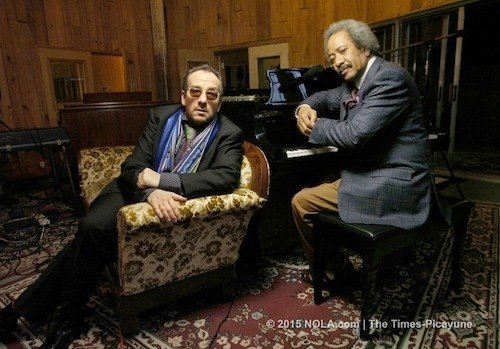
03.14.2015
ELVIS COSTELLO STRIPS DOWN HIS HITS AND LETS HIS LYRICS SHINE IN NEW ORLEANS CONCERT
NOLA.com: Brett Anderson: 13th March 2015
Where does the heart of a pop song lie, in the hands of the full band that originally recorded it or stripped to its barest essentials of vocal and single-instrument accompaniment? Elvis Costello is too genial a showman to ever make such a question part of his show, but much of his performance at the Civic Theater in New Orleans on Thursday (March 12) night gave reason to ponder the answer.
Save for the handful of songs he performed with Allen Toussaint, a memorable stretch from a night that contained a bunch of them, Costello appeared alone onstage, accompanying himself with guitars and piano. While the British rocker rose to prominence alongside the first wave punks with whom he shared a case of righteous anger, he has always been more songsmith than agitator. Costello’s New Orleans show served as a reminder that he is one of the few punk-era songwriters whose catalog could conceivably fuel sing-alongs around the campfire.
Dressed in a dark suit and a hat he could have picked up nearby at Meyer the Hatter, Costello opened with a trio of songs — “(The Angels Wanna Wear My) Red Shoes,” “Blue Minute” and “Watch Your Step” — originally recorded with the Attractions, his peerless backing band in the 1970s and ’80s. Each varied in tempo and tone from its original recording. But reduced to just Costello’s voice and thumb-strummed acoustic guitar, the songs evoked memories so strong it was hard not to wish the Attractions, pub rockers with whip-snap R & B chops, would step out from behind the curtain.
Costello’s argument for the austere arrangements grew stronger with each passing song in the over two-hour long set. He has done time as a talk-show host, and some of his between-song banter was alone worth the price of admission. “Accidents Will Happen” was preceded by a long anecdote about the comely New Mexico cab driver he claims to have inspired it.
Costello stood before a large replica of a vintage television set whose screen broadcast images of classic 45 singles and legendary musicians, many of them from New Orleans. “That’s rock ‘n’ roll, right there,” he said, gesturing to a large photo of Earl Palmer, the New Orleans drummer. He then launched into “Poisoned Rose,” a Costello song from the mid-80s that Palmer played on, strangling his hollow-body electric guitar throughout.
By the time Costello moved over to the piano around mid-set, the sold-out crowd was his. A version of “I Can’t Stand Up for Falling Down” knocked the audience on its heels. A stuttering rave-up that clocked under two minutes in the hands of the Attractions, Costello refocused the song on its pensive lyrics (“I’m the living result/Of a man who’s been hurt a little too much”), stretching it into a showcase for a bluesy vocal performance that that owed more than a little to gospel.
From then on, each song seemed to elicit an applause louder than anything before it. Costello’s fiery rendition of “The River in Reverse,” the title track of the 2006 post-Katrina album he recorded with Toussaint at Piety Studios in New Orleans, teased to the eventual appearance of the New Orleans songwriter and piano-man. “He’s very shy and retiring, my special guest for the evening,” Costello later said of Toussaint, whose floral patterned blazer suggested otherwise.
The duo played effectively loose, particularly on “Ascension Day.” Their affection for each other was never more obvious than when Costello stood back to let Toussaint take the lead on “Who’s Gonna Help Brother Get Further,” visibly content briefly to serve as a guitar sideman at his own show.
The concert appeared to be over when Toussaint and Costello left the stage, with the elder musician saying of his friend’s post-Katrina advocacy: “There was no one on the planet who cared more about New Orleans than this man.”
And then Costello came back, first to nail “Alison,” perhaps his biggest hit, which seemed to give him, and the crowd, a second wind. “Pump it Up” was, improbably, rawer than the original, with Costello throwing his fist at the strings of his electric.
It felt like a fitting end, but the songs kept coming: a sweet rendition of Van Morrison’s “Jackie Wilson Said (I’m in Heaven When You Smile),” a stirring, skeletal “Shabby Doll.” And then, finally, “(What’s So Funny ‘Bout) Peace, Love and Understanding,” sung more or less in unison with the crowd. Costello blew air kisses on his way off the stage.